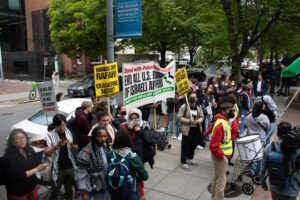As August concludes, the court cases of the 33 protesters who were arrested in May at the DMV Gaza solidarity encampment in University Yard (U-Yard) at George Washington University (GW) are coming to an end.
At least two protesters have had their charges dropped, one has pled guilty and will be forced to do community service, one was a minor at the time of the arrest and there are no publicly available court records on their case, and the remaining 29 have entered into agreements to avoid charges. These agreements include broad stay away orders from GW’s 43-acre campus, which is woven into the surrounding Foggy Bottom neighborhood. While the stay away orders are frustrating for the seven Georgetown students arrested, they have created stress and uncertainty for the at least seven GW students arrested.
All the Georgetown and GW students were charged with unlawful entry, which in D.C. carries a maximum punishment of a $1,000 fine, a 180-day prison sentence, or both. In order to avoid these punishments, 29 protesters have entered into “stet agreements” with the United States Attorney’s Office for D.C. (USAO), according to court records.
These agreements, often used in unlawful entry cases, mean that as long as the arrested students comply with the outlined terms—in this case, a stay away order from GW’s campus and a prohibition on getting arrested again—the charges will be dropped after six months. If students violate the terms of the agreement, their charges could be reinstated, they could be charged with an entirely new crime, they could be held in contempt of court, or a combination of the three.
Miriam Siegel (CAS ’26), who is a member of Jewish Voice for Peace at Georgetown and helped organize the encampment, expressed frustration at the agreement.
“It’s impeding on my life. The stay away order includes GW Hospital — a hospital — and the Foggy Bottom Metro,” she said. “GW is the largest private landowner in D.C. and that’s a lot of land we’re unable to access for six months.”
For the GW students, the stet agreements and stay away orders present an entirely different challenge; many have only been able to receive limited exceptions that allow them to attend class but not much else, whether that is use of the library, visiting a friend in their dorm, or even resting on a bench on GW’s property.
One of the arrested students, who currently attends GW and spoke to the Voice on the condition of anonymity, wondered if she would be able to study in the library or use the Student Health Center this upcoming semester—the answer to both those questions was no.
“I am one of the students that’s currently facing a stay away order from the university, and it has been a long few months of essentially begging for action from the university or from the prosecutors to at least clarify their position on giving us the exceptions we need to continue to be students,” she said.
Mark Goldstone, an attorney who represents one of the students, had to undergo multiple rounds of hearings in order to negotiate even simple exceptions like being able to use the dining hall. He told the Voice that the stay away orders are incredibly broad, punitive, and atypical for this kind of nonviolent offense. In his opinion, the stay away order is unnecessary because the students already have a prohibition on illegal conduct or getting rearrested as part of their stet.
“It’s just weird. I don’t know how else to describe it.”, Goldstone said. “It’s unprecedented that a broader, and more intense stay away is required by the prosecution when the complaining witness has no intention of arresting a student walking to the library or going to the dining hall.”
Carl Messineo, an attorney with the Partnership for Civil Justice Fund who also represents one of the arrested GW students, agreed with Goldstone and said that the breadth of the stay away orders is atypical.
“I’ve been doing this work for 30 years,” he said. “I have never seen such severe restrictions on persons that are charged with nonviolent, peaceful, misdemeanor, protest-related offenses. Most of the time these aren’t even prosecuted.”
Prosecutors in court filings acknowledged the nonviolent nature of the protests but stated that when the arrested individuals ignored multiple dispersal orders from MPD, they “demonstrated a proclivity to refusing to comply with both the law and directives from law enforcement.”
GW, which is considered the complaining witness in the case, has said it is D.C. who decides the terms of a stet but maintains it has always supported exceptions for students to be able to attend class, according to a GW spokesperson.
However, Messineo said that GW is attempting to save face by shifting blame on to the USAO.
“GW University, the largest landowner in the District practically, and the United States government are just covering each other’s backs. The bottom line is, one or both of these institutions has the authority to say ‘we don’t want these stay aways’ or ‘let’s bring it down to something appropriate,’ like a stay away from University Yard,” Messineo said. “Either can do it, neither will.”
The GW student who was arrested said the stay away orders seem to be disproportionate, especially since she and other arrested students are only facing low-level disciplinary charges from GW.
“I think a large part of the frustration with this is because the students, myself and the others, they don’t have formal academic charges from the university that justify this level of punishment on campus,” she said. At least one student has been temporarily suspended, according to reporting by The Washington Post.
Messineo believes that the harshness of the stay away orders is in part due to the nature of the students’ activism—he sees it as an attempt to stifle pro-Palestinian speech by GW and the USAO.
“It’s absolutely a political motivation,” Messineo said.
The United States Attorney’s Office declined to comment, but in court filings, prosecutors wrote that the stay away orders are intended to be “tailored to the particular criminal conduct Defendants engaged in” when they remained illegally on GW property.
Back at Georgetown, Students for Justice in Palestine (SJP) is gearing up to continue their advocacy with the DMV Students for Justice in Palestine Coalition and on campus, while trying to support their friends as they navigate the stay aways, according to Lukas Soloman (SFS ’26), a board member in SJP. GW has also recently agreed to come back to continue negotiating with students on their terms despite the court battles, according to social media posts by organizers. Soloman sees this development as very encouraging.
“It’s a really good sign that the organizing work that GW students have been doing and that the D.C./DMV community at large has been doing has been effective in pressuring George Washington University’s administration,” Soloman said. “Obviously, SJP is not going to free Palestine. That’s never been anybody’s mindset, but we are working in our locale as part of a larger strategy that contributes to the overarching goal of Palestinian liberation.”
Whether Georgetown will have an encampment or similar protests is contingent on how the university administration negotiates with SJP on their demands of financial divestment and academic boycott from Israel, according to Soloman.
“We appreciate the administration’s engagement with us thus far. Our resilient organizing has already resulted in John DeGioia calling for an immediate ceasefire in Gaza this past April,” Soloman said. “However, we recognize that a call for a ceasefire is far from enough. It is the stance of Georgetown SJP and also the Jesuits for that matter: words without actions to back them up are insufficient.”
Editor’s Note: Lukas Soloman once served as an editor for the Voice.
Editor’s Note 8/30 at 3:20 p.m.: A previous version of this story misspelled Goldstone as Goldstein, the error has since been corrected. Two other minor quote attribution errors were also edited.






